Real Estate Investing: How To Buy An Investment Property The Ultimate Guide

Welcome to my guide on how to invest in real estate for beginners! In this article, I will teach you everything you need to know about real estate investing, from finding the right property to making smart decisions while in the market.
So let's get started!
Before You Invest In Real Estate
Before you invest in real estate, be sure to do your research. There are a number of factors to consider, including the market conditions in the area you're interested in, the property's location and condition, and your financial ability to handle a potential investment.
What Is Real Estate Investing?
Real estate investing is the process of buying, owning, and managing the real estate with the goal of making a profit. When you invest in real estate, you are essentially purchasing an asset that can provide you with income for years to come. There are a number of different ways to invest in real estate, and each has its own benefits and drawbacks. Some people choose to buy low and sell high, while others prefer to buy properties outright and manage them themselves. No matter which route you choose, it is important to do your research before investing in any property.
How To Make Profit Real Estate Investing
When comes to investing, one of the most popular paths in real estate. Why? Because of the consistent and reliable returns that can be generated over time. However, it’s not just any old investment – real estate requires a bit more work than most other forms of investment.
So, we're here to help you get started in the world of investing in real estate. In this guide, we will outline everything you need to know in order to get started – from understanding the basics of property valuation and market analysis to finding your perfect investment property. So read on and get ready for some serious profits!
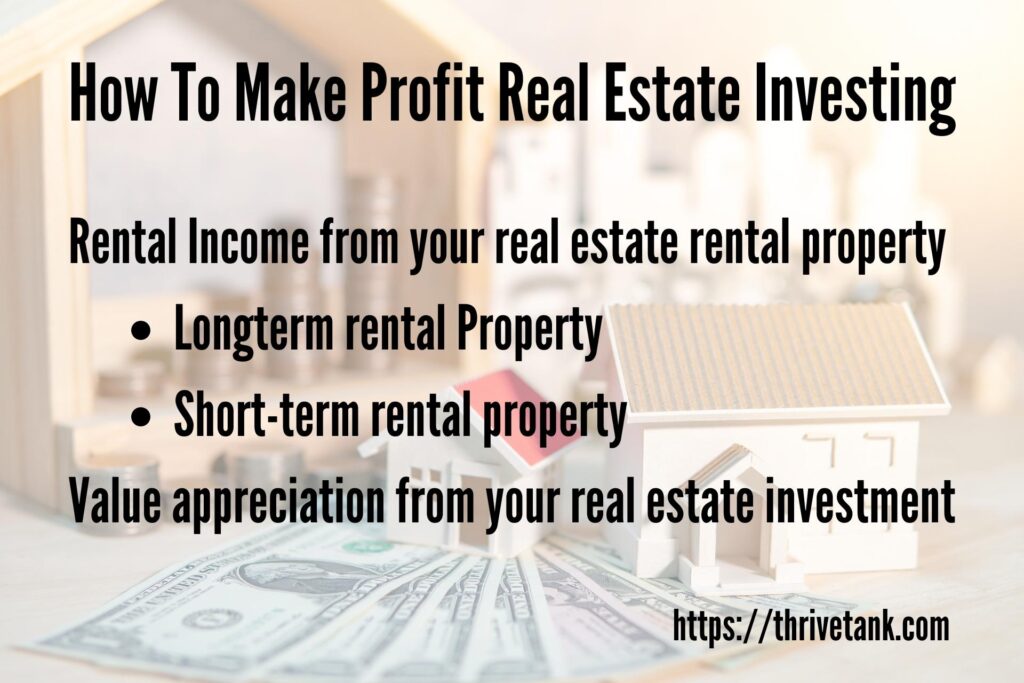
Rental Income from your real estate rental property
Real estate investing can be a great way to make rental income and grow your portfolio. When you buy and manage rental property, you can earn rental income from them. This is a great way to get started in real estate investing, as it is one of the most consistent ways to make money. There are a number of things that you will need to do in order to be successful with rental property investment strategy, but with a little hard work, you should be able to succeed.
Before you start buying investment property and managing rental properties, it is important to have a good understanding of property valuation and market analysis. This will help you to decide which properties are worth investing in and which ones are not. You will also need to be aware of current market trends in order to make informed decisions about where to invest.
Once you have chosen a rental property, it is important to do your research into the area. This will help you to understand the local market and understand any potential risks associated with the investment. You should also consider things like zoning laws and infrastructure when making your decision.
Finally, remember that real estate is a long-term investment – so prepare yourself for a long journey before you see any profits! However, with hard work and some sound financial planning, real estate can be a very profitable investment for beginners' rental income.
Value appreciation from your real estate investment
For many people, buying and owning real estate is seen as a long-term investment that can provide significant returns. Over time, the value of your property may increase due to factors such as rising home values, increased demand from local residents or investors, or innovative construction techniques. This means that even if you don’t sell your property for a period, you can still make a profit by following the market trends and adjusting your expectations accordingly.
Property values have gone up over time throughout history. This rise in value is called appreciation. Any expert would agree that location is the most important thing to consider when making an investment. When people think that a neighborhood is nice, property values go up. Have you ever heard the saying, "Buy the worst-looking house in the best neighborhood?" This is true to some extent. It's better to buy a house that needs some work in a good neighborhood than a house that's fine but in a bad one. You can also think about investing in an area that is growing quickly.
Figure Out Your Investing Goals
Figure out your investing goals is one of the first things you need to do before getting started in real estate. Once you know what you're looking for, it's easier to start narrowing down potential investments and find properties that fit your needs.
When it comes to real estate, there are a few different types of investors: active, passive, and hybrid. Active investors are the ones who work with brokers and deal directly with properties. Passive investors invest through a managed fund or trust. Hybrids try to mix both approaches, working with a broker but also looking at properties themselves from time to time.
No matter what type of investor you are, there are certain things you need to keep in mind when investing in real estate: Location is key - make sure the property is located in an area that's growing or has potential for growth. Properties should be inspected carefully - make sure everything looks good on the surface and look for any problems (like asbestos) that may need to be fixed before purchase. Don't overspend - always aim to buy low and sell high, but don't go overboard either. Remember that property values can go up and down over time, so don't put all your eggs in one basket.
6 Strategies For Beginners How To Invest In Real Estate
Investing in real estate can be scary for people who don't know much about it. Investors may not feel completely at ease with real estate for a few months. So, investing strategies that are easy to understand is a good place to start. Even though they are good for investors with little or no experience, they can still make a lot of money if they are managed well.
Investing in a niche that is easy for beginners to understand is a great way to learn the ropes before moving on to more difficult investments. By starting with a simple plan, investors can get to know their local market, build a network, and learn how to raise money without committing to a deal they might not be able to handle. Then, investors can use what they've learned and the money they've made to move on to other strategies in the future.
Here are some tips for people who have never invested in real estate before:
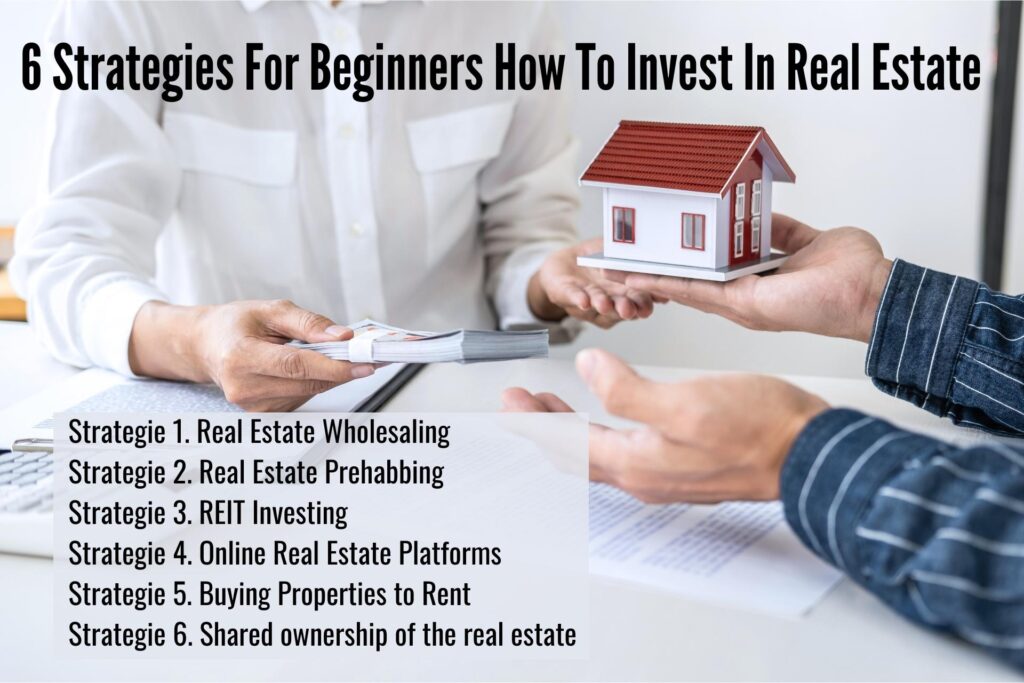
Strategie 1. Real Estate Wholesaling
Real estate wholesaling is a process by which a real estate professional sells a property they have not personally purchased themselves. This can be done through a brokerage, auction house, or direct sales approach. The goal of wholesaling is to find a buyer for the property who can make it profitable for the real estate professional.
With the wholesale strategy, investors can act as a go-between for sellers and buyers. Wholesalers will find and buy a property for less than its market value. They will then sell the contract to a final buyer.
There are many factors that go into successful real estate wholesaling, including finding the right property and marketing it effectively. A real estate wholesaler must have knowledge of the market, as well as the ability to negotiate and deal with potential buyers. Some things that may help in this process include being well-versed in MLS listings, knowing about comps and zoning laws in the area, and having good contacts in the industry.
Wholesaling is an important part of the real estate market, and those interested should start by learning more about it before taking any steps forward.
Strategie 2. Real Estate Prehabbing
A great way to start investing in real estate is through "prehabbing." In a rehab, money is needed to make big changes, but in a prehab project, only small changes need to be made. Investors usually make just enough changes to a property to make it look appealing to other investors. Prehabbing means making minor improvements to a property instead of making big changes. Some pre-renovation projects are:
- Cleaning: Taking the time to clean up a property and get rid of trash and other junk can make a big difference in how appealing it is.
- Painting: Painting is a cheap way for beginners to improve the look of their home because it doesn't cost much.
- Landscaping: If people don't like the outside of the property, they probably won't want to take the time to come inside. Even if you don't believe it, the way a house looks from the outside can help it sell for very little money.
Investors who are interested in this strategy should know that not every property is good for a prehab. Look for houses that are still in good shape and just need to be cleaned up. Stay away from houses that need expensive repairs right away. Also, when looking for prehab houses, you should always keep location in mind. Do research on your market and find neighborhoods that are popular or on the rise.
When you learn how to invest in real estate, it should be easy to see how appealing prehabbing is. Compared to other ways to invest, it has minor risk and requires minor work. It also gives you a quick return on your money.
Strategie 3. REIT Investing
REITs, or real estate investment trusts, are a good place to start for people who are new to real estate.
REITs are a type of real estate investment trust. They are a way for people to invest in real estate without having to deal with the hassle and stress of owning a property themselves. REITs offer investors a way to gain exposure to a wide range of properties, from single-family homes to apartments and office buildings.
REITs have some important advantages over other types of real estate investments. First, they provide an easy way for investors to get into the market. Second, REITs are liquid assets, meaning that they can be converted into cash easily. This makes REITs a good option for people who want to quickly move their money into other investments or use it to pay off debt.
REITS also offer some unique benefits that aren’t available with other types of real estate investments. For instance, REITS tend to be more stable than individual properties because they are typically composed of many distinct assets (such as land, buildings, and securities). This makes them a good choice for people who want exposure to the long-term financial prospects of the real estate market.?
Strategie 4. Online Real Estate Platforms
It is possible to connect borrowers and investors using online real estate platforms, often known as real estate crowdfunding platforms. Real estate crowdfunding platforms offer online tools to connect borrowers with investors. Platforms allow borrowers to post listings of real estate properties they want to sell, and then accept funding from investors who are looking to purchase the property. The platforms also provide a platform for borrowers and investors to communicate and work together to arrange a purchase of the property.
Some popular real estate crowdfunding platforms include RealtyShares, RealtyMogul, Fundraise, and CircleUp. These platforms allow individuals to invest in a variety of real estate projects, including commercial properties, single-family homes, and multifamily buildings.
Overall, online real estate crowdfunding platforms provide an easy way for borrowers and investors to connect with each other. They offer a variety of financing options as well as detailed information about each project so that everyone can make an informed decision about investing in it.?
Strategie 5. Buying Properties to Rent
Are you ready to rent out a place? Buying rental properties can be a great way to make sure you have a steady income every month.
Real estate investing is a great way to make money on the side. If you're looking for a way to generate some extra income, renting out your property might be a great option for you. First, you'll need to decide if you're ready to take on the responsibility of being a landlord. Buying rental properties can be a great way to ensure that you have a steady income every month. Once you've made the decision to invest in real estate, there are a few things you'll need to do before getting started. First, research the market and find properties that fit your budget. Second, get pre-approved for loans so you can get started buying property right away. Finally, be prepared to maintain your property and make sure it's in good condition so tenants will want to stay there long-term.
Strategie 6. Shared ownership of the real estate
A real estate syndication is a group of people who invest in real estate working together to find and buy properties. This can be done through a variety of methods including joint ventures, partnerships, and syndications. Syndication allows for greater liquidity and reduced risk for investors, as well as more opportunities to get involved in the market and increase their returns.
Real estate syndication can be an exciting way to get involved in the property market. It can provide access to properties that would not be available to individual investors and allow for greater diversification of investment holdings. However, it is important to do your research before getting involved in a syndicate and make sure that you are comfortable with the risks involved.
Understand some important Real Estate Terms For Beginners
If you have done any research at all, one of the first things you will have noticed is how many confusing jargon terms and acronyms there are. Even though there are a lot of real estate terms, you need to know at least the most important ones so that other professionals will take you seriously. Here are a few words to get you started:
Capitalization Rate
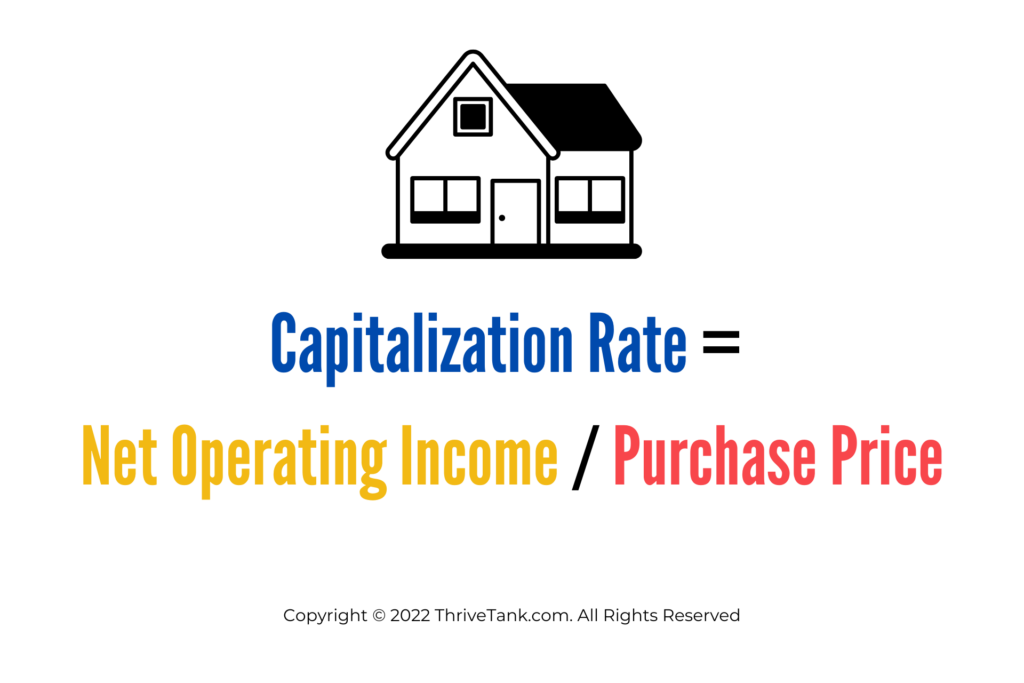
The cap rate is used in real estate investing to help investors figure out the value of a property. The cap rate is always given as a percentage and it is based on the current market value of the property. This helps investors figure out how much money they can make from an investment deal.
Capitalization Rate = Net Operating Income / Purchase Price
Understand the Cash flow
Real estate investing is a business that is based on the principle of cash flow. Cash flow describes how money comes in and goes out of a business. When a business generates more cash than it spends, it has positive cash flow. When a business spends more money than it brings in, it has negative cash flow.
Cash flow is important for both personal and business finances. For personal finances, having positive cash flow means that you have enough money to cover your bills and still have some left over for savings or other goals. For businesses, positive cash flow means that they are able to pay their bills on time, invest in new products or services, and keep enough money in the bank to cover unexpected expenses.
Real estate investing is not for everyone. Before starting any kind of investment project, be sure to do your research and consult with an accountant or financial advisor to make sure that your investment meets your specific needs and goals.
For example, a person who invests in rental property will often figure out the monthly cash flow, which is the property's rental income minus all of its costs. Investors will look for properties that will bring in money each month.
Recommended book: Rich Dad's CASHFLOW Quadrant, Rich Dad's Guide to Financial Freedom.
How to Figure Out Net Operating Income (NOI)
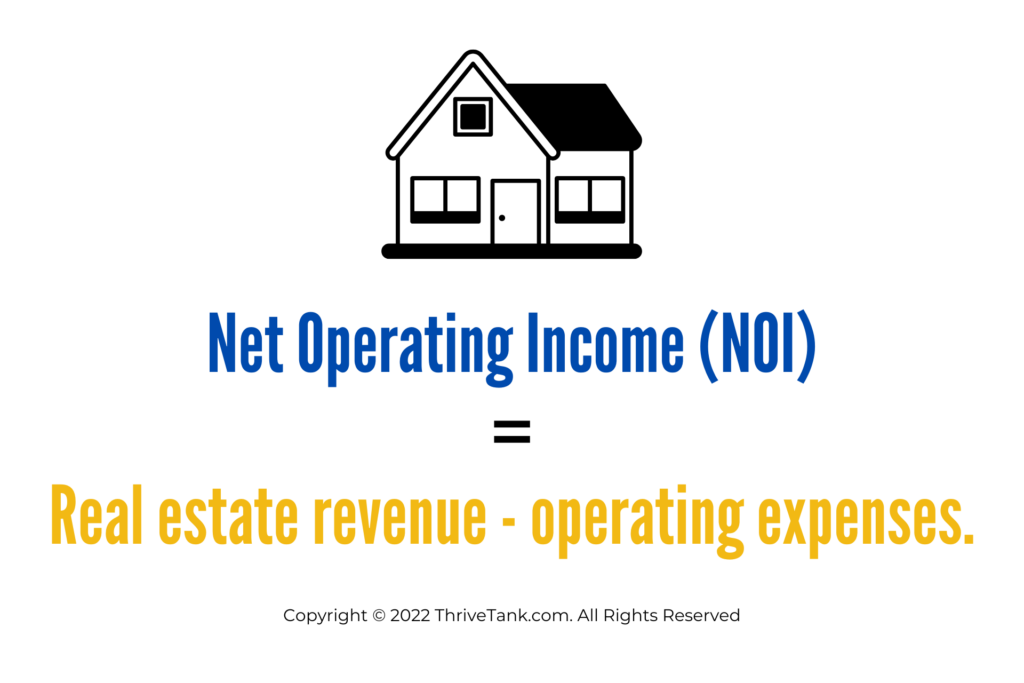
The cash flow calculation and the net operating income (NOI) go hand in hand.
Real estate investing is a great way to make money and build wealth over time. When you buy and sell real estate, you are essentially creating cash flow. This cash flow can be used to pay down debt, save for retirement, or just enjoy the growth of your investment.
Here is the formula for figuring out NOI: NOI = property income - operating costs.
Real Estate Investment Trusts (REITs)
REITs are a great way for beginners to get into real estate investing. They are a type of company that owns and runs a portfolio of real estate properties. This means that the REIT can make money from the rents that it collects from the properties in its portfolio. This is different than buying and managing individual properties, which is what most people do when they invest in real estate.
REITs have many benefits for investors. They are usually well-managed companies with a good track record, so you can be sure that your money will be safe. They also offer diversification benefits: since they own a variety of different types of properties, REITs tend to be less risky than investing only in stocks or only in the property. Finally, REITs tend to pay higher dividends than other types of investments, so they offer investors an attractive return on investment.
What is Real Estate Owned (REO)
Real estate investing for beginners can be a great way to get started in the market. When purchasing an REO property, it is important to do your research first. These properties are often in poor condition and may need substantial rehabilitation. Make sure to inspect the property closely and ask questions about its history of the property. Once you have determined that the property is a good fit for your goals, be prepared to put in some work. Rehabilitating an REO property can be a difficult process, but with patience and hard work, it can be worth it.
Understanding Return On Investment (ROI)
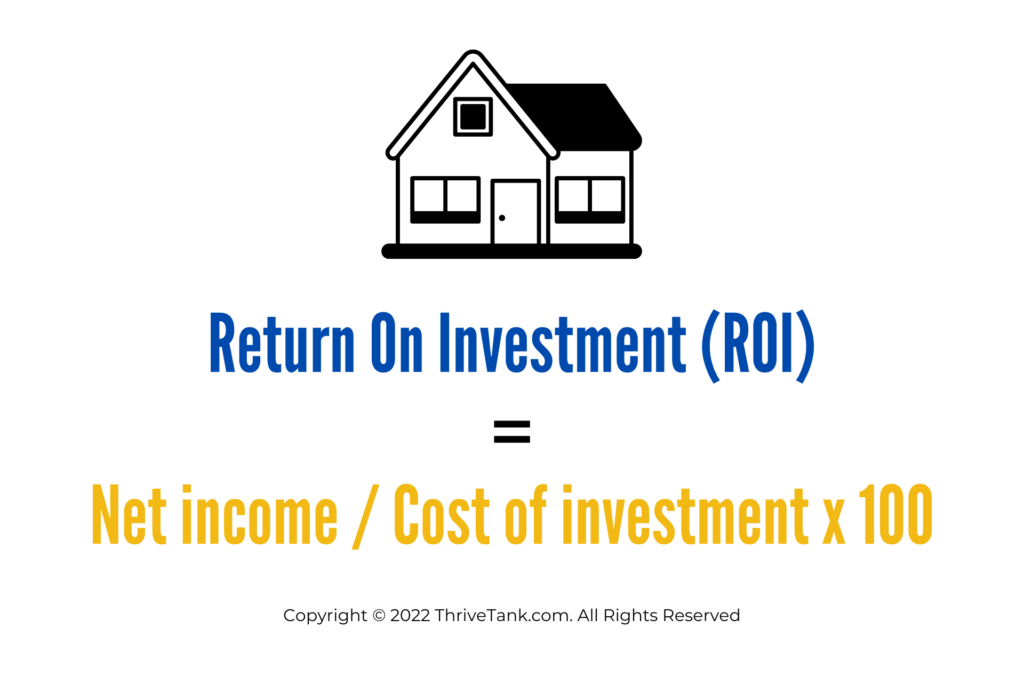
Understanding Return On Investment (ROI) is critical for real estate investors. A high ROI means that a property has generated a greater return on investment than what was spent to purchase and maintain it. There are many factors that contribute to the success of a real estate investment, but a high ROI is often the key factor in making profitable real estate deals.
There are several ways to figure out ROI. Most people use net income divided by the total cost of the investment, or ROI = Net income / Cost of investment x 100.
Habits of Successful Property Investors
There are some key habits of successful property investors that can be applied to any type of investment, real estate included.
First and foremost, property investing is a long-term game. It’s important to remember that the market always goes up and down, so don’t get too attached to any one deal or property. Be patient and understand that there will be ebbs and flows in the market over time.
Secondly, it’s important to have a strong understanding of the local market. Don’t invest in a property unless you know what it's worth and what kind of competition is out there. There are plenty of online resources available to help you with this – check out sites like Zillow or Trulia for example.
Finally, it’s important to stay disciplined when it comes to property investing. Make sure you are closely monitoring your expenses (both monetary and time-related) and never let your emotions get in the way of sound decision-making. Property investing can be a very rewarding experience, but it takes hard work, diligence, and patience to achieve success over time!
How To Buy An Investment Property:
The Ultimate Guide
Whether this is your first investment property or you’re a seasoned pro, we’ve got you covered. In this guide, we’ll teach you everything you need to know about buying an investment property.

Step 1: Determine Your Investment Property Type
There are three main types of investment properties: rental, commercial, and residential.
Each has its own set of pros and cons that you should consider before making a purchase.
Residential properties are the most popular type because they offer tax benefits and the potential to make money over time by renting out space to tenants. However, residential properties can also be riskier since they are often more expensive to buy and maintain than other types of investments.
Commercial properties are typically larger and have a higher potential for return on investment (ROI). However, turning a profit can be more difficult if the market goes down, and there is typically greater competition for commercial property listings.
Rental properties offer the opportunity to make money while letting someone else manage your property day-to-day. They can be a good option for people who want less risk but still want some control over their investment.
Step 2: Determine Your Budget
The second step in buying an investment property is to determine your budget. This will help you figure out how much money you can afford to spend on a property and still stay within your desired investment goals. There are a number of factors to consider when calculating your budgets, such as your down payment size and monthly payments. Remember to always keep in mind the goal of purchasing an investment property – not just making a quick buck.
Step 3: Do Your Research
When you're ready to buy an investment property, you should do your homework. There are many factors to consider when buying a property, such as location, size, and price. You should also view the property’s history and the current market conditions. You can use online resources, such as Zillow and Trulia, to find information about specific properties in your area. Additionally, you can talk to real estate agents and experts in the field to get advice on which properties are best for your investment goals. It is important to be informed about all of the options available before making a purchase, so you can make the best decision for yourself and your financial security.
Step 4: Get Pre-Approved for a Loan
There are a few things you'll need before you can get pre-approved for a loan. First and foremost, your credit score will need to be in the good range. Second, you'll likely need to have enough money saved up to cover the down payment and closing costs. Third, you'll want to make sure that the property you're buying is worth the investment. Finally, it's important to be prepared for any potential delays or hiccups during the loan approval process. Once all of these items are in order, your journey to becoming a homeowner just got a little bit easier!
Step 5: Choose the Right Property
It is important to choose the right investment property for your needs. There are a few factors to consider when selecting an investment property, such as location, size, and amenities.
Location is key when looking for an investment property. Try to find a location that is in a desirable area with good schools and access to transportation.
Size is also important when looking for an investment property. Make sure you pick a size that meets your needs. Some people prefer smaller properties while others prefer larger ones.
amenities are also important when looking for an investment property. Make sure the property has things like pools, clubhouses, and fitness centers that will make it more comfortable to live in and enjoy.
Step 6: Negotiate the Best Price
When buying an investment property, the most important step is negotiating the best price. There are a few things you can do to get a better deal:
-Know your budget: Make sure you know how much money you're willing to spend and what kind of property you're looking for. This will help you narrow down your search and target properties that fit within your price range.
-Be prepared to walk away: Don't be afraid to walk away from a property if it's not right for you. If the seller is unwilling to lower their price, don't hesitate to find another property that meets your needs. You may be able to get a better deal by going this route.
-Talk to other agents: Ask other agents whether they've been able to negotiate better prices on similar properties. They may be able to give you some tips on how best to proceed.
Step 7: Make an Offer
When you are ready to make an offer on a property, the first step is to determine what the property's fair market value is. You can do this by using a number of resources, such as online listing services or real estate agents. Once you have a ballpark figure, you can then make an offer that reflects the true value of the property.
Step 8: Finalize the Deal
Once you have determined that a property is a right fit for your investment goals, the final step is to negotiate and finalize the deal. There are several steps you'll need to take to ensure a successful purchase:
1. Verify the Property's Details: Make sure all information in the listing is accurate, including square footage, lot size, and assessment values. Contact the property's neighbors and research any recent updates or changes.
2. Negotiate a Fair Purchase Price: Use your analysis of comparable properties to establish a starting point for negotiations. Be prepared to walk away if you don't feel you're getting an accurate estimate of what the property is worth.
3. Get Pre-Approved for Title Insurance: Title insurance protects your investment by ensuring that the property can be sold without difficulty and that any liens or mortgages on it will be honored. Ask your real estate agent if he or she can get you pre-approved for title insurance; it's usually not expensive to do this upfront.
4. Prepare For Closing: Have all of your documents ready before closing, including copies of your deeds, loan documents, tax returns (if applicable), and identification.
5. Manage Maintenance and Repairs: Make sure you have a comprehensive maintenance plan in place, including estimated costs for common repairs, such as roofing, painting, and plumbing. Bear in mind that your purchase may incur additional taxes and fees, so be prepared to budget for them.
6. Enjoy Your New Investment!
Ready to jump into the world of investment property ownership? Follow these simple tips and you'll be on your way to success.
How to Avoid Making Mistakes investing in real estate
If you're interested in buying a property for investment purposes, there are a few things to keep in mind. First, make sure you have a solid understanding of the market conditions in your area before putting any money down. Second, be sure to do your research on potential properties and make sure you're getting an appropriate return on your investment. Finally, never forget that it takes time and effort to succeed in real estate investing - so be patient and keep your eyes open for opportunities!
Here is some other mistake to avoid:
1. Not doing your homework before you buy a property. Make sure you do your research and understand the area you are buying in, its history, and the current market conditions.
2. Not being realistic about what you can afford to spend on a property. Don't be tempted to overspend just because it's an investment - remember that if the property doesn't appreciate in value, you will end up losing money.
3. Not considering all your options before making a decision. Don't be afraid to walk away from a property if it doesn't fit your needs or doesn't have the right return on investment.
4. Forgetting to factor in maintenance, repairs, and other costs associated with owning a property. It's important to keep in mind that not everything is covered in the price of a property. Factor these costs into your calculations when looking at potential properties.
5. Focusing only on the short-term benefits of owning a property instead of thinking about the long-term financial stability you will achieve by investing in real estate. Remember that over time, owning real estate can provide you with a steady stream of passive income - so don't let short-term fluctuations bother you!
6. When you're just starting out, it can be tempting to do what everyone else does. But betting on speculation and crossing your fingers that a property's value will go up is one of the worst ways for a beginner to invest in real estate.
7. Forgetting to do your due diligence: Adding to what was said above, doing your due diligence is an important part of choosing a good investment deal. No matter how good a deal seems at first, investors should always be careful to look at the numbers in detail. This could include figuring out how much money will come in, how much it will cost to fix, and how much demand there is on the market.
8. Buying at market value: There isn't much room for profit when you buy a property at its market value. Investors in real estate are experts at finding great deals or buying homes in bad shape for much less than their market value.
9. Investing too much of your own money: Put yourself and your business at risk when you invest too much of your own money. Investors would be smart to keep their personal finances separate from their business finances and keep as much money as possible in a reserve fund.
10. Not having more than one way to get out of your investment: Investors should always be ready for projects that don't go as planned, which is inevitable. Because of this, investors who have done this before have more than one backup plan. For example, if a house flip goes wrong, you should have a backup plan, like a buy-and-hold or a wholesaling plan.
11. Getting attached emotionally: It's easy to get attached emotionally to one of the first possible deals you find. But it's very important to keep a level head and act like a business person. Even if a deal seems great at first, you should always do your research.
12. Some people may think that real estate investing is something they can do on their own, but nothing could be further from the truth. Some might even say that investing in real estate is just a "people person" business. For investors to be successful, they need a strong network of professionals they can count on, whether they want to find their next deal, form a partnership, or get expert advice.
8 Books On Real Estate Investing For Beginners to intermediate
There are many books on real estate investing for beginners. The following are five of the best.
1. Rich Dad Poor Dad: 20th Anniversary Edition: What the Rich Teach Their Kids About Money That the Poor and Middle Class Do Not! by Robert T. Kiyosaki
2. The Book on Investing In Real Estate with No (and Low) Money Down: Creative Strategies for Investing in Real Estate Using Other People's Money (BiggerPockets Rental Kit 1) by Brandon Turner (Author, Narrator), BiggerPockets Publishing, LLC (Publisher)
3. Real Estate Investing QuickStart Guide, The Simplified Beginner’s Guide to Successfully Securing Financing, Closing Your First Deal, and Building Wealth Real Estate (QuickStart Guides™ - Finance) by Symon He (Author), Kevin Wagner (Narrator), ClydeBank Media LLC (Publisher)
4. Buy, Rehab, Rent, Refinance, Repeat: The BRRRR Rental Property Investment Strategy Made Simple
by David M Greene (Author), Clifford Ponder (Narrator), BiggerPockets Publishing (Publisher)
6. The Real Book of Real Estate: Real Experts. Real Stories. Real Life by Robert T. Kiyosaki
(Author), Mel Foster (Narrator), Joyce Bean (Narrator), Mikael Naramore (Narrator)
7. The Book on Rental Property Investing: How to Create Wealth and Passive Income Through Smart Buy & Hold Real Estate Investing by Brandon Turner, BiggerPockets Publishing, LLC (Publisher)
8. Rich Dad Advisors: ABCs of Real Estate Investing: The Secrets of Finding Hidden Profits Most Investors Miss by Ken McElroy (Author), Garrett Sutton (Narrator), Hachette Audio (Publisher)
Conclusion
Buying an investment property can be a daunting task, but with this guide, you’ll be well on your way to buying your first dreaming property.
In this guide, I have provided everything you need to know about investing in real estate for beginners. I hope you find my tips helpful and that you are able to start investing in real estate for yourself soon!
